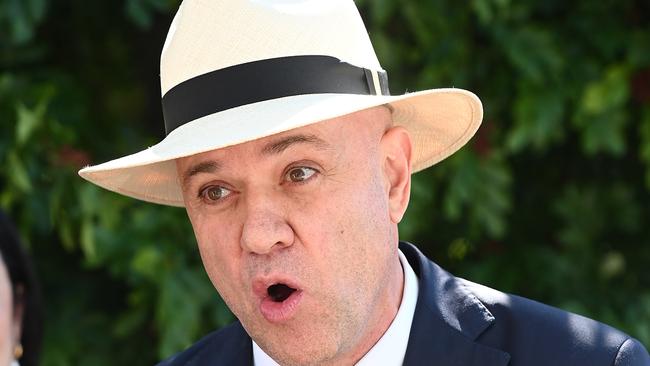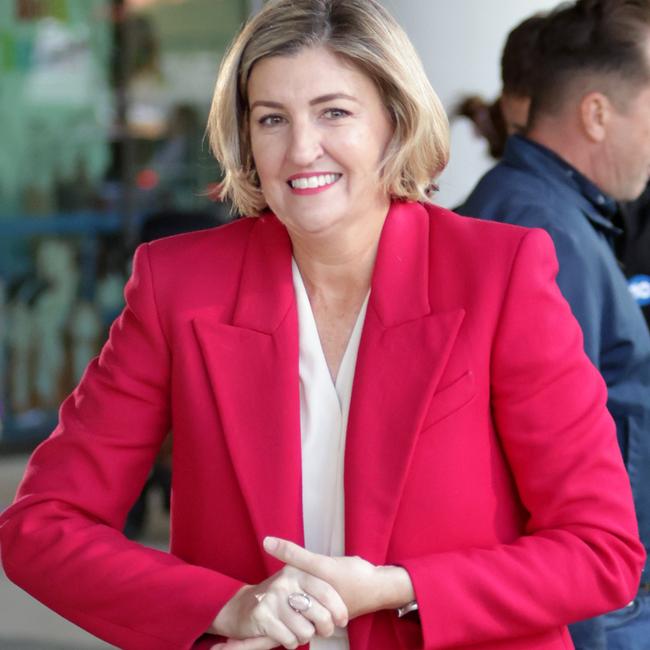Social media contributes to toll on mental health of 14 to 25-year-olds
Queensland’s chief health officer has admitted his serious concerns for the health of the state’s teens and reached out to counterparts, as a shocking new survey reveals just how many are in need of help.

QLD News
Don't miss out on the headlines from QLD News. Followed categories will be added to My News.
Nine out of 10 Queensland young people are struggling with their mental health and more than half are totally burnt out, with social media contributing to the decline in wellbeing.
The shocking results from a new survey come as the state government prepares to launch an Australia-first strategy to break the cycle of despair.
Research commissioned by Health and Wellbeing Queensland, the state’s prevention agency, revealed that social media had been a leading contributor to the sliding health and wellbeing over the past year in 14 to 25-year-olds.
Isolation from friends, low self-esteem, poor sleep, no money and no autonomy have also played a part in bringing down the younger generation at a time they should be at their most energetic and hopeful.
Over half of the 1400 surveyed reported feeling “tired for no reason” or that “everything was an effort”, with health experts saying these are the warning signs of a generation burnt out and in need of help.
Chief health officer John Gerrard has told The Courier-Mail he had grave concerns about the decline in wellbeing in young Queenslanders, which has been on the downward trend for more than a decade.
Dr Gerrard is so worried about the influence of social media he is liaising with federal counterparts and Health Minister Shannon Fentiman on the best way to tackle the potentially dangerous habit.
“Although there are probably several reasons it is likely that social media and smart phones are contributors,” he said.

Health and Wellbeing Queensland deputy CEO Gemma Hodgetts said the program Thriving Lives, Connected Communities would set the direction for future action on an individual, community and collective level to prioritise the health and wellbeing of Queenslanders to drive positive mental health outcomes.
“Almost one in two Queenslanders will experience mental ill-health in their lifetime, with people influenced by different protective and risk factors for their mental health during different stages of life,” Ms Hodgetts said.
Thriving Lives, Connected Communities was developed by Health and Wellbeing Queensland in partnership with the Queensland Mental Health Commission and marks the Queensland government’s first step in delivering a statewide mental health and wellbeing strategy.
“Young Queenslanders, who should be our most vibrant, energetic and hopeful generation, are struggling,’ Ms Hodgetts said.
“Almost one in two Queenslanders will experience mental ill-health in their lifetime, with people influenced by different protective and risk factors for their mental health during different stages of life.
“About 75 per cent of mental disorders emerge before the age of 24 years so we need to act now to support the individual, community and collective mental health and wellbeing of Queensland,” she said.
“Thriving Lives, Connected Communities” is the first phase of the Queensland Government’s $4m commitment to developing a mental health and wellbeing strategy.
Community initiatives and services will lead the way in restoring human connection and happiness.
The commitment outlines $308.8m in current investments in mental health and wellbeing over 2024–25 and future years and a new $9m grants program over three years for eligible community-based initiatives to enhance wellbeing and support good mental health.
“Thriving Lives, Connected Communities recognises that mental health is interconnected with physical, emotional, social, cultural and environmental factors,” Ms Hodgetts said.
“It’s widely recognised that maintaining high levels of wellbeing protects good mental health and aids recovery from mental illness.
“That’s why we’re delivering Australia’s first strategy to take a deliberate wellbeing approach that focuses on population wellbeing to help Queenslanders maintain or return to good mental health.”
Ms Fentiman said: “The report out today is deeply concerning, and I want to assure Queenslanders that their mental health and wellbeing remains a top priority for the Miles Government.
“We know that young people in particular experience complex mental health challenges, and more young people than ever before are seeking treatment for anxiety, eating disorders, and mental health crisis.
“It’s why I’m so glad we’re taking a fresh approach to helping all Queenslanders live healthy and happy lives by working directly with them to understand their needs.
“No one knows what’s best for a community more than the people who live there, and this is a wonderful opportunity for real change at a community level to boost wellbeing and mental health outcomes.
“Once fully developed, this new strategy will focus on social factors including economic security, safe and affordable housing, and access to transport.
“The Miles Government remains committed to improving wellbeing and mental health outcomes across Queensland, and I look forward to the later release of the mental health and wellbeing strategy and action plan.”
More Coverage
Originally published as Social media contributes to toll on mental health of 14 to 25-year-olds




